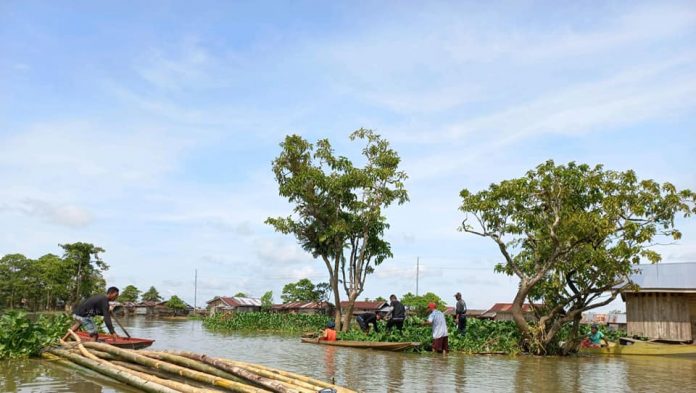It used to be just floating houses in Agusan Marsh. Now, residents of this wetland have built flood-resilient floating gardens to make themselves productive even in these times of the COVID-19 pandemic.
Ma. Angelita Salome D. Acopiado, chief of Provincial Environment and Natural Resources Office-Local Government Unit (PENRO-LGU), said the floating gardens were patterned after those in the flood-prone water bodies in Odisha, India.
Two such gardens planted with vegetables were initially built last month on the 10-hectare Lake Kaebatasan in Barangay Sabang Gibong.
The barangay asked for support for the floating gardens after experiencing constant flooding since December 2020 resulting in local food shortage. Residents agreed to the idea of pilot-testing the technology from India in their place.
The gardens were built using local materials including bamboo, water hyacinth, and farm compost.
The PENRO-LGU initiated the project as part of its effort to conserve biodiversity in the marsh by providing sustainable livelihoods to local communities that benefit from its ecological services.
The barangay council and Bantay Danao, a community-based volunteer conservation group, serve as PENRO-LGU’s local partners.
Talacogon has a locally declared conservation area within and around the Agusan Marsh Wildlife Sanctuary.
The declaration is contained in Municipal Ordinance No. 288-2019 authored by Kagawad Thomas Balinton. It covers Barangays Buena Gracia, Causwagan, Desamparados, La Flora, Maharlika, Marbon, Sabang Gibong, San Agustin, San Nicolas and Zillovia.
Agusan Marsh is a protected area governed by the National Integrated Protected Areas Act. Aside from serving as a catch basin for flood waters, It is known as a destination of migratory birds from the Northern Hemisphere during the winter season. (Chris V. Panganiban/MindaNews)







